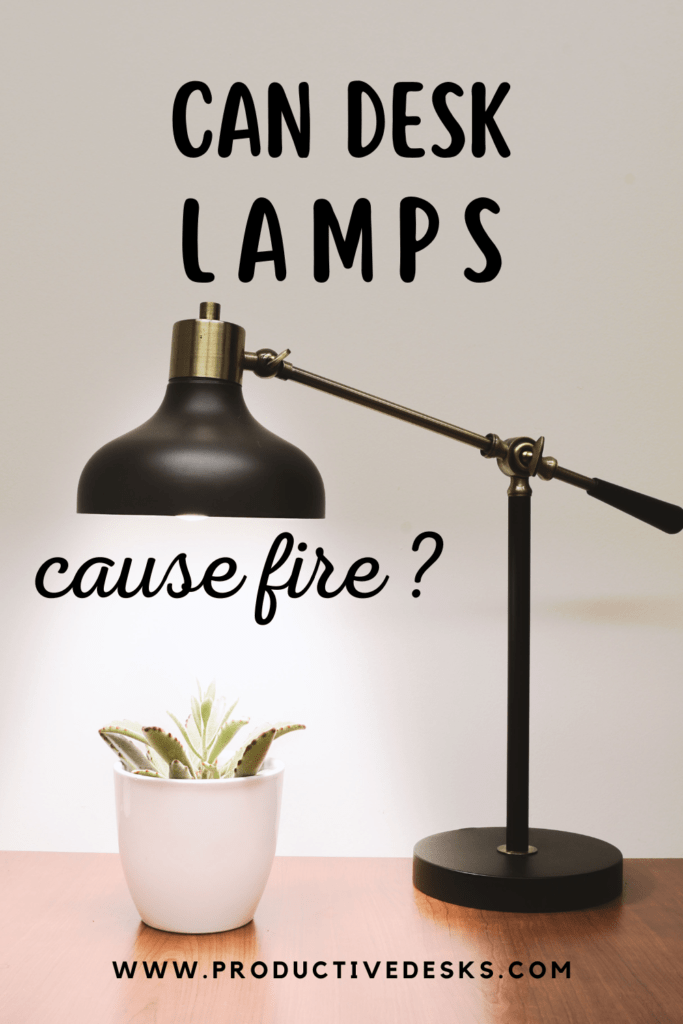- What Type Of Light Bulb is Used In Desk Lamps?
- Which One Is Most Likely To Cause A Fire?
- Can Desk Lamps Cause Fire? [Reasons]
- Few Ways You Can Make Your Home Safer
- Here Is How To Care for your Desk Lamp to Avoid Accidents
- What Should I Do If My Lamp Catches On Fire?
- Led Lamps Are Less Likely To Overheat
Corded desk lamps are the most common type of lighting in an office environment and throughout the world. Their popularity is driven by their ease of use and convenience, but corded lamps come with risks.
Studies show that home electrical fires account for an estimated 51,000 fires each year. One of the causes of these incidents is the use of desk lamps.
The risk is exacerbated by the fact that many people use them at night when they’re tired and not as mentally alert. These fires can cause serious damage to property and life.
So, when does a desk lamp pose a fire risk? How to reduce this risk and prevent fire accidents in your home office? How to build a secure and safe workspace?
We will answer all of this and more in this article. Let’s dive in!
What Type Of Light Bulb is Used In Desk Lamps?
There are various light bulb styles, but the most used ones are incandescent, LED, and fluorescent.
These three types of light bulbs have different features and benefits.
- Incandescent bulbs are the most common but don’t last as long as the other two and are more expensive in the long run using high wattage.
- Fluorescent bulbs are good if you want to save energy because they’re cheaper to operate, they last longer, and they generate less heat. You can think of CFLs as the more energy-efficient cousin of incandescents. But one downside of CFLs is that the light they produce isn’t that great.
- LED lightbulbs work best in areas where there’s no natural light and are also great for those who need a lot of light. They use up very little energy and last for a really long time.
- Halogen lightbulbs are also a variation of incandescent as they work with the same filament heating process.
So, There Are Many Different Types Of Light Bulbs, But Which One Is Most Likely To Cause A Fire?

Incandescent light bulbs are the most likely to cause a fire.
This is because they use tungsten wire filaments that get hot and can easily ignite nearby objects like curtains or clothing. It’s not the only risk. They may also explode without warning if the bulb is too cold or wet or lacks proper sealing.
Halogen light bulbs, a variation of incandescent bulbs, also pose a high risk for fires because they emit infrared radiation, which can heat up nearby objects and start a fire.
LED lights have the lowest risk of causing fires because they don’t emit infrared radiation, so there’s no chance of them starting a fire. LED bulbs pose no fire hazard thanks to their ability to absorb the heat they create.
Therefore, if you are planning to buy a desk lamp, we recommend LED lamps with adjustable heads.
Reasons Why Desk Lamps Catch Fire
Lamps are a common household item that can cause fires. There are several reasons why lamps can cause fires, including the following:
– The lamp is too close to something flammable such as clothes, curtains, or furniture.
– The lampshade is too close to the bulb.
– The lamp has a faulty wiring system.
– The bulb is touching the shade or fabric.
– The lamp has an exposed wire or cord near something flammable such as clothes, curtains, or furniture.
Besides the abovementioned situations, the type of lamp you are using can also start a fire.
If you are using an old-fashioned incandescent lamp, then the heat from the bulb can cause a fire.
This is because the filament in the bulb gets so hot that it starts to break down and release gases, which can catch fire if they come into contact with something flammable.
If you are using a halogen desk lamp, then the heat from this type of bulb can melt some materials and start a fire.
Halogen bulbs have a gas inside them that heats up when electricity passes through them. This gas will often be mixed with other chemicals like mercury or argon, which will start to evaporate when they get too hot.

Let's Talk About A Few Ways You Can Make Your Home Safer
A desk lamp fire can be a major threat to your home.
In fact, they are the leading cause of home fires in the United States. To better protect your home from fires and reduce the dangers of desk Lamps, here are some tips to follow:
-Keep lamps at least 3 feet away from anything that can burn or catch fire.
-Don’t use a corded desk lamp if you live in an apartment building. Use a battery-operated one instead. Corded lamps can cause fires in multi-unit buildings because of their power requirements and heavy electricity use.
-Use only bulbs with a shade made of a material that does not easily catch fire or melt.
-Never leave a lamp on when you leave the room or go to sleep.
-Turn off lamps before you go to bed or leave the room.
-Keep children and pets away from lit lamps, especially when they are asleep or playing on the floor near them.
-Make sure that your home has working smoke alarms, carbon monoxide detectors, and fire extinguishers.
Here Is How To Care for your Desk Lamp to Avoid Accidents
A desk lamp is an essential part of any office setting. It provides light for reading, writing, and other tasks. But, desk lamps are not always designed to be safe for use around children or pets.
The goal of this section is to provide a step-by-step guide on how to care for your desk lamp.
- The first thing you should do is inspect the lamp and make sure it’s not broken. If you find that the lamp has been broken, then you should replace it immediately.
- Make sure that you replace the bulb regularly to avoid over-heating the lamp and causing an accident.
- Clean up any papers, books, clothes, or other items on or around the lamp.
- It’s also important to ensure that no cords are hanging around your workspace, as they can cause accidents when tangled up with other items or people.
- You should also clean the desk lamp regularly by wiping it down with a damp cloth and using a dry cloth to wipe away any dust that accumulates on the surface.
- Make sure that the cord is out of reach from children or pets, and place the lamp, so it doesn’t fall over.
What Should I Do If My Lamp Catches On Fire?
If the lamp is plugged in, immediately unplug it. If the lamp is not plugged in, make sure there are no flammable materials nearby, and then use a fire extinguisher to put out the flame or smother it with a damp cloth.
If you have a gas lamp and it catches on fire, turn off the gas valve immediately.
Call the fire department if the fire is bigger than what you can handle. You don’t want it to get out of control.
Led Lamps Are Less Likely To Overheat
LED lamps are great alternatives to traditional light bulbs, especially if you are looking for a long-lasting and energy-efficient option.
LEDs emit very little heat. In comparison, incandescent bulbs release 90% of their energy as heat, and CFLs release about 80% of their energy as heat.
This is because LEDs emit heat through their entire surface area rather than just from the filament.
The heat emitted by LEDs is also more evenly distributed, making it easier for the lamp to dissipate heat and stay cool.
The researchers found LEDs generate some heat, but it was not enough to cause any damage to the surroundings.
If you are looking for an energy-efficient light bulb, you should consider investing in an LED lamp.
Can Desk Lamps Cause Fire - Final Thoughts
Our article has come to an end.
So, can desk lamps catch fire? The answer is yes, if not used properly.
Here are some things we learned about desk lamps and their wise consumption:
- They should not be placed too close to flammable materials. And the bulb should be of a low wattage so that it doesn’t overheat and cause a fire.
- As mentioned above, we recommend getting a LED desk lamp, preferably battery-operated, in order to avoid the risk of fire and the heavy use of electricity.
- Make sure you switch it off whenever it’s not in use.
- One of the most important things you should do is to keep children and pets away from it, as well as books and anything else that can catch fire.
And that just about wraps it up. We hope you had fun reading our article and learned a thing or two from it.
DO you have some stories about it? Don’t hesitate to share your thoughts with us! We would love to hear from you.


